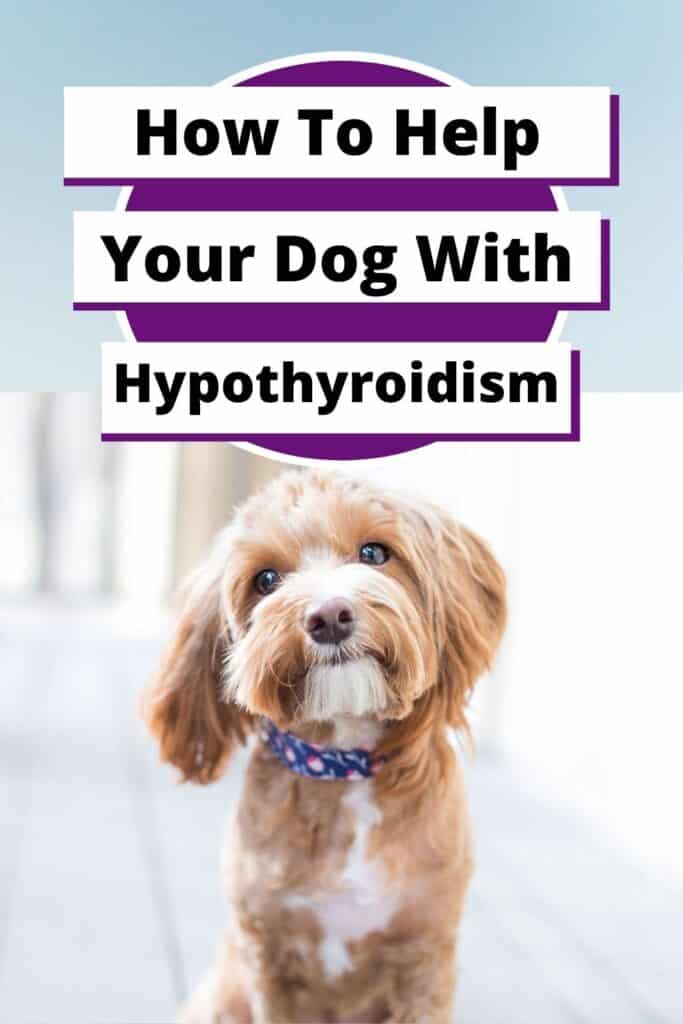The most common endocrine hormone disorder in dogs is hypothyroidism. The body's thyroid hormone concentrations are low, resulting in this disorder.
The butterfly-shaped gland in your dog's upper neck produces thyroid hormones that control metabolism and, therefore, body temperature.
Dog hypothyroidism is characterized by hair loss, dry coats, fever, skin infections, obesity, and lethargy. Dogs with hypothyroidism may seek heat and warmth because they feel cold.
Hypothyroidism is more common in older or middle-aged dogs. 90% of hypothyroid dogs suffer from idiopathic atrophy or autoimmune distraction of their thyroid glands. In humans, this condition is like Hashimoto's thyroiditis.
The condition cannot be prevented, but your dog can live a healthy life once it has been diagnosed and treated.
A general list of breeds predisposed to hypothyroidism includes:
- Golden Retriever
- Irish Setters
- Doberman Pinschers
- Cocker Spaniels
- Miniature Schnauzers
- Airedale Terriers
- Dachshunds
- Boxers
How is Hypothyroidism Diagnosed?
The only way to diagnose hypothyroidism is by ordering a blood test from your veterinarian.
Hypothyroidism in dogs is always treated with lifelong prescription medications and regular monitoring by your veterinarian.
Holistic approaches can help your dog return to health, but there are no natural remedies or over-the-counter medications that can replace hormone supplementation from a veterinarian.

What are the Signs of Hypothyroidism?
It is common for virtually every organ in the body to be affected by a slowdown in metabolism.
Dogs with hypothyroidism usually exhibit one or more of the following signs:
- Gaining weight without increasing appetite
- Lack of motivation to exercise and lethargy
- Intolerance to cold (gets cold easily)
- Hair that is dull, dry, and shedding excessively
- Hair coat that is very thin to nearly bald
- An increase in dark skin pigmentation
- Skin and ear infections are more likely to occur
- Hair does not grow back after being clipped or shaved
- A high cholesterol level
- The heart rate is slow
Some dogs also have other abnormalities such as:
- Thickening of the facial skin, giving them a tragic expression
- Nerve dysfunction causing non-painful lameness, lack of coordination, and a head tilt
- Infertility and loss of libido in intact males
- An inability to conceive, infertility, and abortion (miscarriage) in females
- The corneas of the eyes contain fat deposits
- Keratoconjunctivitis sicca (KCS) or dry eye is caused by inadequate tear production
Can Hypothyroidism Be Treated?
Hypothyroidism can be treated, but it cannot be cured. Thyroid replacement hormone is administered orally.
The dog will have to take this drug for the rest of its life. In most cases, levothyroxine is chosen as the preferred treatment (brand names include Thyro-Tabs® Canine, Synthroid®).
When to Contact Your Veterinarian
Consult a veterinarian if you suspect your dog has hypothyroidism before adding any supplements or changing her diet.
Your dog's medication dosage will vary after a hypothyroidism diagnosis, so it's important to monitor this condition by having blood work done every six to twelve months.
Your veterinarian will discuss whether your dog's thyroid hormone needs to be increased or decreased based on the results of his blood work.
Even if your dog seems to be feeling better, she will need prescription medication for the rest of her life.
Some Solutions
Hypothyroid symptoms vary between dogs, so you should only choose potential solutions that support your dogs individual’s individual symptoms.
Below are some of the most common hypothyroid symptoms that healthy nutrition and supplementation may help improve.
Dog Food for Hypothyroidism
Please discuss with your veterinarian whether your dog requires a prescription weight loss food. It is sometimes necessary to give dogs prescription dog food while their metabolisms are restored.
After your dog's metabolism returns to normal levels, you may want to try some of the prescription food recommendations if your dog is overweight.
Prescription foods - As opposed to a standard AAFCO balanced diet, prescription weight loss foods are formulated to provide more nutrients in a lower calorie food.
By feeding a low-calorie diet to your dog, you can give him the nutrition he needs without sacrificing his weight. It is sometimes necessary to feed your dog prescription foods until its thyroid is properly treated and medicated.
Non-prescription foods - Depending on the results of your dog's bloodwork, you may be able to transition your dog to a food formula that meets the caloric needs of a typical dog with a normal metabolism after he responds well to medication.
Mix ¾ Kibble and ¼ Raw - Introducing wet or raw food into her diet may help her slim down if she is currently eating kibble and having trouble losing weight. Both types of food are low in carbohydrates, and eliminating carbohydrates leads to weight loss.
In particular, raw food can help your dog get nutrition similar to what its ancestors might have consumed. In addition, it contains high-quality meat, plenty of moisture, and fewer carbohydrates.
Disclosure: Some of the links in this article are affiliate links (Amazon Associate or other programs we take part in). As an Amazon Associate, I earn a small commission from qualifying purchases.
Strenghten Your Dog's Skin
Make your dog's skin and coat stronger by switching to a diet specially formulated for this purpose. A raw diet is good for improving skin and coat health.
Taking essential fatty acid supplements is important to the health of your dog's skin and coat, as well as their overall wellbeing.
For dog's hypothyroidism consider adding the following to their diet:
- Salmon/Pollock oil
- Primal Sardine Grind
- Super Snouts Green Lipid Muscle
Improve your Dogs Immune System through Good Digestive Health
The best way to improve your dog's immune system is to improve the strength and health of her digestive system.
Supplement with Digestive Enzymes
Natural digestive enzymes, which are present in route food, are essential for your dog's potty to break down into pieces that can be easily absorbed. These enzymes help release more nutrients from the food your dog consumes.
Products with digestive enzymes, such as proteins, proteases, cellulases, and lipases, are recommended.
In terms of digestive supplements, some to consider include:
- Clover OptaGest
- Animals Essentials Plant Enzymes and Probiotics
- Herbsmith Microflora Plus
- Honest Kitchen Pro Bloom Goat’s Milk.
Add Probiotics
Dogs' digestive tracts are nourished with beneficial bacteria through probiotic supplements.
You may want to consider probiotic supplements such as:
Add Probiotics - Tripe is an excellent natural source of healthy probiotics. Most humans find the smell unappetizing, but most dogs love the taste!
Foods and treats that contain tripe include Vital Essentials frozen and freeze-dried toppers, K9 Natural freeze dried, frozen and canned foods, and Ziwipeak air dried and canned foods.
Add pre-biotics - Prebiotic feed the good bacteria already in your dog's digestive tract. You can choose a diet that includes probiotics or add them as a supplement.
Pre-biotic supplements to consider include - Clover Optagest, Ark Natural Gentle DigestTtraits, Honest Kitchen Perfect Form and Herbsmith with Microflora Plus.
Can I Expect Results
With thyroid hormone supplementation prescribed by a veterinarian, your dog me showing improvement in overall attitude and energy levels within a few weeks.
However, hair regrowth and noticeable weight loss may take up to four months or longer than notice.






Leave a Reply